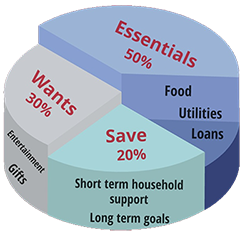Building Generational Wealth- Kids & Money Management

Building Generational Wealth: Children & Money Management
There’s no need to keep the money talk away from your children. They're not too young to learn the impact of proper money management, and it's a good idea to get them familiar and comfortable with the concept of managing money from a young age. A head start on savings and handling money can be a head start on life.
How To Start Saving
|
Most adults are familiar with, and some practice the 80-20 saving formula; save 20% of your net income every month. The remaining 80% is used for spending and is typically broken down as: 50% on needs and 30% on wants or leisure. |
 |
While you can vary from this equation depending on your individual situation, it's a great rule of thumb to guide you. But... in the case of your children who neither have an income nor and have the responsibility of paying bills, how can they balance savings with leisure?
Setting Short- and Long-Term Savings goals
Teaching children about savings is a brilliant way for them to understand about short term and long term goals. Discuss with them the difference between a want and a need. This may be a tricky concept for them to understand, and just like eating vegetables or doing homework, you may need to incentivize your kids to save! They’ll learn to like it in time.
A savings incentive, for example, could be your promise to match the contribution they make to their piggy bank with a little something from mum and dad. If they save a dollar, you could match the dollar.
When they learn about short term savings goals, this might revolve around the small stuff like wanting to chip in on ice cream, pocket money for sweets from the school canteen, or to buy themselves smaller rewards like toys, art supplies and games.

Long term
In a world of instant gratification, long term savings goals mean “more sacrifice” to a child, however they also mean a bigger reward.
What's your child’s big picture? Let's say it's a new a gaming system like Xbox or PS4. That's not something mum or dad will buy every day. Encourage your child to investigate the cost of the gaming system. Now, ask them, what will it take to save up enough? Remember, this shouldn't make your son or daughter feel like their goal is totally out of reach. Rather, it should act as a motivator to put in a little elbow grease when working towards your big picture goals - something we're pretty familiar with by now!
Give them a SureStart
|
A savings account like SureStart is a great way for kids to start managing money and saving towards short- and long-term goals.
|
 |
The SureStart account is a student bank account that can be the first step in providing opportunities for your children to learn about managing money and start growing their savings.
To further encourage savings, there’s no monthly charge on these accounts, and interest is calculated quarterly and paid semi-annually. The attractive tiered interest rate structure earns higher yields as the balance grows.
[Learn More] https://www.cibcfcib.com/personal-banking/bank-accounts/sure-start
Earning Their Own Money
Are you comfortable giving your child an allowance or giving them spending money in exchange for chores? Though allowance or chore money is not a common practice in the Caribbean it teaches our young ones the value of earning money.
They can even learn how to track their spending using an app, or if you create a savings board as a craft project at home. This replicates the experience they’ll have as they become young adults and need to start monitoring real money with real life consequences!
No matter how you choose to encourage your children to save money, remember one thing: don’t be afraid to talk about “finances” with your kids in a positive and constructive way.
